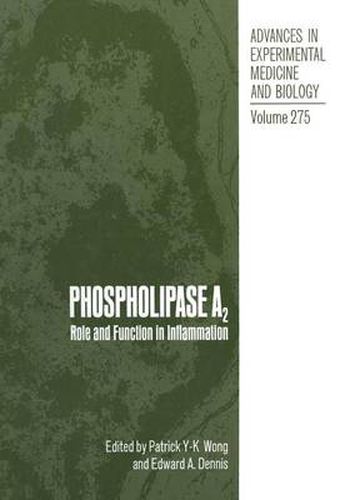Readings Newsletter
Become a Readings Member to make your shopping experience even easier.
Sign in or sign up for free!
You’re not far away from qualifying for FREE standard shipping within Australia
You’ve qualified for FREE standard shipping within Australia
The cart is loading…






This title is printed to order. This book may have been self-published. If so, we cannot guarantee the quality of the content. In the main most books will have gone through the editing process however some may not. We therefore suggest that you be aware of this before ordering this book. If in doubt check either the author or publisher’s details as we are unable to accept any returns unless they are faulty. Please contact us if you have any questions.
This volume in the Advances in Experimental Medicine and Biology Series is dedicated to developing an overall view of the state-of the-art of knowledge in the field of phospholipase A2 and to exploring the role and function of this enzyme in various inflammatory diseases. This book grew out of two major symposia on phospholipase A2 held in 1989: I). Phospholipase A2: Pathophysiological Role of Soluble and Membrane-Bound Enzymes organized by Dr. Doug Morgan and Dr. Ann Welton of Hoffmann-La Roche and sponsored by the New York Academy of Sciences (January 24, 1989). II). Release and Function of Phospholipase A2 from Inflammatory Cells organized by Dr. Patrick Wong and Dr. Edward Dennis at the FASEB meeting in New Orleans (March 22, 1989). Readers will find exciting advances in our understanding of the structure, function and molecular biology of phospholipase A2 research which is presented in this volume. The elucidation of gene structures of phospholipase A2 should lead to new insights and new approches in the control and regulation of the enzyme activity. This is primary to better understanding the function of phospholipase A2 and the determination of its activity in cellular and animal systems. Of great importance is the development of animal models for inflammatory disease in order to evaluate the role of phospholipase A2 and its inhibitors. We are convinced that this volume will be an excellent reference that surveys this field in which numerous investigators are currently actively at work.
$9.00 standard shipping within Australia
FREE standard shipping within Australia for orders over $100.00
Express & International shipping calculated at checkout
Stock availability can be subject to change without notice. We recommend calling the shop or contacting our online team to check availability of low stock items. Please see our Shopping Online page for more details.
This title is printed to order. This book may have been self-published. If so, we cannot guarantee the quality of the content. In the main most books will have gone through the editing process however some may not. We therefore suggest that you be aware of this before ordering this book. If in doubt check either the author or publisher’s details as we are unable to accept any returns unless they are faulty. Please contact us if you have any questions.
This volume in the Advances in Experimental Medicine and Biology Series is dedicated to developing an overall view of the state-of the-art of knowledge in the field of phospholipase A2 and to exploring the role and function of this enzyme in various inflammatory diseases. This book grew out of two major symposia on phospholipase A2 held in 1989: I). Phospholipase A2: Pathophysiological Role of Soluble and Membrane-Bound Enzymes organized by Dr. Doug Morgan and Dr. Ann Welton of Hoffmann-La Roche and sponsored by the New York Academy of Sciences (January 24, 1989). II). Release and Function of Phospholipase A2 from Inflammatory Cells organized by Dr. Patrick Wong and Dr. Edward Dennis at the FASEB meeting in New Orleans (March 22, 1989). Readers will find exciting advances in our understanding of the structure, function and molecular biology of phospholipase A2 research which is presented in this volume. The elucidation of gene structures of phospholipase A2 should lead to new insights and new approches in the control and regulation of the enzyme activity. This is primary to better understanding the function of phospholipase A2 and the determination of its activity in cellular and animal systems. Of great importance is the development of animal models for inflammatory disease in order to evaluate the role of phospholipase A2 and its inhibitors. We are convinced that this volume will be an excellent reference that surveys this field in which numerous investigators are currently actively at work.